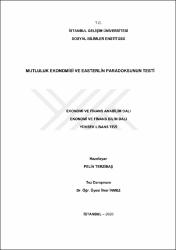| dc.contributor.author | Terzibaş, Pelin | |
| dc.date.accessioned | 2020-06-20T13:42:44Z | |
| dc.date.available | 2020-06-20T13:42:44Z | |
| dc.date.issued | 2020 | en_US |
| dc.date.submitted | 2020-02-17 | |
| dc.identifier.uri | https://hdl.handle.net/11363/2236 | |
| dc.description | Danışman: DR. ÖĞR. ÜYESİ İLKER İNMEZ
Yer Bilgisi: İstanbul Gelişim Üniversitesi / Sosyal Bilimler Enstitüsü / Ekonomi Finans Anabilim Dalı / Ekonomi ve Finans Bilim Dalı
Konu: Ekonomi = Economics | en_US |
| dc.description.abstract | Uzun yıllardan beri araştırmacılar, mutluluk kavramıyla ilgili tam olarak fikir birliğine varamamışlardır. Mutluluk, 1970 yılından itibaren iktisat bilimi alanına girmiş ama ilk yıllarda çok fazla ilgi görememiştir. Davranışsal iktisat ile beraber merak edilen konulardan olmuştur. Bireyi neler mutlu eder, bu sebepler birey ve toplumlar için aynı mıdır, belli süre sonra değişim gösterir mi gibi sorular, mutluluk ve iktisat ilişkisini güçlendirmiştir. 1974 yılında Richard Easterlin makalesiyle yeni bir kavram olarak "Easterlin Paradoksu" literatürde yerini almıştır. Easterlin Paradoksun'un temelinde yükselen gelirin mutluluğu her zaman arttırmadığı; düşük gelire sahip bazı ülkelerin yüksek gelire sahip diğer ülkelere göre mutluluk seviyesinin daha yüksek olduğu sonucu yatar. Paradoksla beraber seneler içinde bu sonuçları destekleyici birçok çalışma literatürde yer almıştır. Özellikle 2000'li yıllarla beraber çalışmalar artmıştır. Bu çalışmada mutluluk, gelir, büyüme, yaşam memnuniyeti, tüketim, tasarruf ve buna benzer ekonomik faaliyetlerle ilişkisi seçilmiş ülke örnekleri itibariyle karşılaştırmalı olarak incelenmiş, Easterlin Paradoksuna ait somut örnekler sunulmuştur. Özellikle son dönemlerde psikolojideki çalışmalara ek olarak konunun ekonomik ve sosyal politika alanlarında da çalışılmaya başlanması ile kavram gitgide derin bir hal almıştır. Uluslararası yazıma göre Türkiye'deki mutluluk temalı araştırmalar yeni sayılabilecek alanı oluşturmaktadır. Tezimiz açısından literatüre katkı sağlamak, 'mutluluk ekonomisi' alanına ilgi çekme ve az çalışılmış konu üzerinde ülkemiz için de farkındalık yaratma amacı önem teşkil ederken, Dünya Mutluluk Raporu, Mutlu Gezegen Endeksi, Dünya Mutluluk Veritabanı, Dünya Değerler Araştırması ve TÜİK verileri ışığında ülke karşılaştırmaları yapılarak gelir mutluluk dengesi açıklanmaya çalışılacaktır. | en_US |
| dc.description.abstract | For many years, researchers have not been able to fully agree on the concept of happiness. Happiness entered the field of economics since 1970, but it did not attract much attention in the first years. Along with behavioral economics, it has been one of the curious issues. Questions such as what makes the individual happy, are these reasons the same for individuals and societies and whether they change after a certain period strengthened the relationship between happiness and economics. In 1974, the "Easterlin Paradox" took its place in the literature as a new concept with the article of Richard Easterlin. Rising income across the Easterlin Paradox does not always increase happiness; It is the conclusion that some countries with low income have higher levels of happiness than other countries with high income. Along with the paradox, many researchers supporting these results have been included in the literature over the years. Studies have increased especially with the 2000s. Our thesis, which investigates the relationship between happiness, income, growth, life satisfaction, consumption, savings and similar economic activities under the title of "Happiness Economy", will also contribute to the evaluation of the Easterlin Paradox test in terms of countries. Especially recently, the concept has become more and more intense with the introduction of the subject in the fields of economic and social policy in addition to the studies in psychology. According to international spelling themed happiness research in Turkey constitutes a relatively new field. While it is important to contribute to the literature in our thesis, to attract attention to the field of 'happiness economy' and to raise awareness for the less studied subject for our country, country comparisons are made in the light of the World Happiness Report, Happy Planet Index, World Happiness Database, World Values Research and Turkish Statistical Institute data. income happiness balance will be explained. | en_US |
| dc.language.iso | tur | en_US |
| dc.publisher | İstanbul Gelişim Üniversitesi Sosyal Bilimler Enstitüsü | en_US |
| dc.rights | info:eu-repo/semantics/openAccess | en_US |
| dc.rights | Attribution-NonCommercial-NoDerivs 3.0 United States | * |
| dc.rights.uri | http://creativecommons.org/licenses/by-nc-nd/3.0/us/ | * |
| dc.subject | Mutluluk | en_US |
| dc.subject | Easterlin Paradoksu | en_US |
| dc.subject | Yaşam Memnuniyeti | en_US |
| dc.subject | Happiness | en_US |
| dc.subject | Easterlin Paradox | en_US |
| dc.subject | Life Satisfaction | en_US |
| dc.title | Mutluluk ekonomisi ve Easterlin Paradoksunun testi | en_US |
| dc.title.alternative | Happiness economy and the test of Easterlin Paradox | en_US |
| dc.type | masterThesis | en_US |
| dc.department | Sosyal Bilimler Enstitüsü | en_US |
| dc.relation.publicationcategory | Tez | en_US |



















